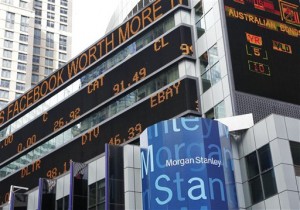NEW YORK – The horrendous stock market debut for Facebook suggests investors are not ready to jump in and create another tech bubble despite big expectations for social media, analysts say.

A financial news stock ticker on Morgan Stanley headquarters carries a headline about Facebook, Wednesday, May 23, 2012 in New York. Regulators are examining whether Morgan Stanley, the investment bank that shepherded Facebook through its highly publicized stock offering last week, selectively informed clients of an analyst's negative report about the company before the stock started trading. (AP Photo/Mark Lennihan)
Facebook closed out its first full week of trade with a loss of 16 percent from its offering price of $38, in a huge disappointment after a much-hyped initial public offering worth $16 billion, the biggest for a tech firm.
The stock failed to live up to the anticipation of some who thought investors would be stampeding to get a piece of the network which has 900 million users.
“When you see Facebook share prices tank, it does get people back on to a more foundational basis, in terms of real revenues, real profits,” said Nick Landell-Mills at Indigo Equity Research.
Mark Heesen, president of the National Venture Capital Association, said investors are being more cautious than during the tech bubble of the late 1990s.
“This is by no means the end of social media. It is going to continue to grow and expand,” he said.
But he said that during the tech bubble, “venture capitalists invested $150 billion in two years. In the last two years we invested about $60 billion. There is much, much less money in the system right now. That’s critically important.”
Gerard Hoberg, professor of finance at the University of Maryland, said he does not expect a new bubble, given today’s market sentiment.
“I think it’s very healthy and I think people learned the lessons from the 1990s,” he said. “It’s preventing a bubble from forming.”
Facebook appeared to be the driving force in a surge into social media. But some of its social media brethren are also being watched cautiously.
Zynga, the social gaming website which has strong ties with Facebook, has lost some 35 percent, and the online deals firm Groupon has slid nearly 40 percent. But the professional social network LinkedIn has doubled in a year since its IPO.
Heesen said the mixed reaction to these IPOs has taken some of the froth out of the market.
“If Facebook languishes, that does send a signal to others (tech firms) that maybe going public is not the best option – maybe getting acquired or trying to wait out this volatile period is better,” he said.
“The whole social media arena is still ripe for investment,” he added, but cautioned there will be “bumps along the road.”
Landell-Mills said that even though investors appear unwilling to chase share prices, they will flock to a company that makes real profits, like Apple, up 67 percent in the past year.
“I’d never call Apple a bubble,” he said.
The analyst said that Facebook still has a lofty valuation when measured by earnings, unlike some firms such as Google.
“When Google went to its IPO there were some very clear data points which suggested that it added value,” he said. “With Facebook, we don’t know.”
But Hoberg said the market does not have the exuberance of the 1990s.
“People are not going to let a frothy stock keep going, they’re pushing back,” he said.
He maintained that any new IPO will have to take into account the Facebook fiasco.
“This reaction is so negative, and the underwriters are getting so much bad press that they really cannot afford to have that happen again, so they’re going to take steps to underprice the next one even more just to make it so that the investment machine returns to health,” he said.

